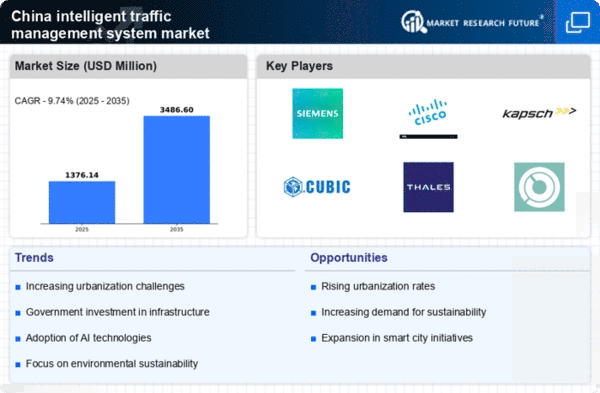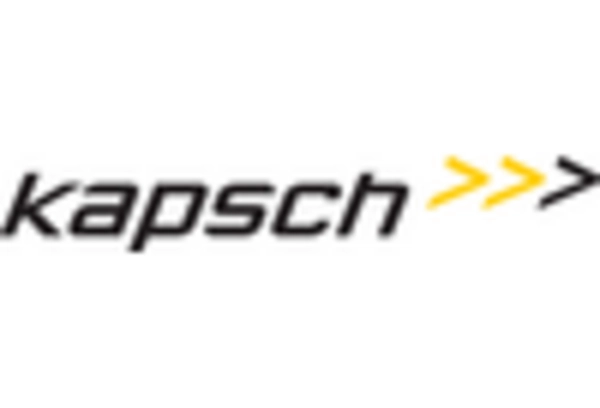Increased Focus on Road Safety
The growing emphasis on road safety is a significant driver for the intelligent traffic-management-system market in China. With rising traffic accidents and fatalities, there is an urgent need for systems that can enhance safety measures on the roads. In 2025, it is projected that the market will see increased investments in technologies that monitor and manage traffic conditions to prevent accidents. Intelligent traffic systems can provide real-time alerts to drivers, optimize traffic signals to reduce congestion, and improve overall road safety. This focus on safety not only addresses public concerns but also aligns with governmental objectives to create safer urban environments. As a result, the intelligent traffic-management-system market is likely to expand as stakeholders prioritize safety-enhancing technologies.
Public Transportation Integration
The integration of public transportation systems with intelligent traffic management is emerging as a key driver for the market in China. As urban populations grow, the need for efficient public transport solutions becomes increasingly critical. By 2025, it is anticipated that cities will invest in intelligent traffic systems that facilitate seamless connections between various modes of transport, including buses, subways, and ride-sharing services. This integration can lead to reduced congestion and improved accessibility for commuters. Moreover, intelligent traffic-management systems can optimize public transport routes and schedules based on real-time data, enhancing the overall user experience. Consequently, the intelligent traffic-management-system market is expected to benefit from this trend, as cities strive to create more interconnected and efficient transportation networks.
Urbanization and Population Growth
The rapid urbanization in China is a crucial driver for the intelligent traffic management system market. As cities expand and populations increase, the demand for efficient traffic management becomes paramount. In 2025, urban areas in China are projected to house over 60% of the population, leading to heightened traffic congestion. This scenario necessitates advanced traffic solutions to optimize flow and reduce delays. The intelligent traffic-management-system market is likely to see significant growth as municipalities invest in technologies that can handle the complexities of urban traffic. Moreover, Integrating real-time data analytics into these systems can enhance decision-making processes and improve overall traffic efficiency. Consequently, the urbanization trend is expected to propel the market forward, as cities seek to implement smarter solutions to manage their growing transportation needs.
Government Regulations and Policies
Government regulations and policies play a pivotal role in shaping the intelligent traffic-management-system market in China. The Chinese government has been actively promoting smart city initiatives, which include the implementation of intelligent traffic systems. By 2025, it is expected that various policies will mandate the integration of advanced traffic management solutions in urban planning. This regulatory environment encourages investments in intelligent systems that can enhance traffic safety and efficiency. Furthermore, the government's commitment to reducing carbon emissions aligns with the objectives of the intelligent traffic-management-system market, as these systems can facilitate greener transportation options. Consequently, the interplay between government policies and market dynamics is likely to foster growth in the sector, as stakeholders align their strategies with regulatory expectations.
Technological Advancements in Transportation
Technological innovations are fundamentally reshaping the landscape of the intelligent traffic-management-system market. In China, advancements in sensor technology, data analytics, and communication systems are driving the development of more sophisticated traffic management solutions. For instance, the deployment of Internet of Things (IoT) devices allows for real-time monitoring of traffic conditions, which can lead to more responsive traffic signal control. By 2025, it is anticipated that the market will witness a surge in the adoption of AI-driven systems that can predict traffic patterns and optimize routes. This technological evolution not only enhances traffic flow but also contributes to reduced emissions and improved safety. As a result, the intelligent traffic-management-system market is positioned to benefit from these advancements, as stakeholders seek to leverage technology for better urban mobility.
















